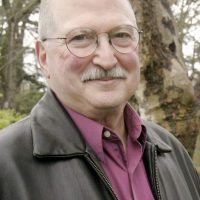View this post on Instagram
{*Did you know you can write on Elephant? Here’s how—big changes: How to Write & Make Money or at least Be of Benefit on Elephant. ~ Waylon}
~
There are as many ways of dying as there are of living—often, they are the same.
My father Norman, for example, was an anxious man. He wanted to be in control always.
We’d go out to eat dinner as a family and he’d make a scene about our table. “I don’t want to be so close to the kitchen,” he’d complain, or “This table is too drafty.” If the service was slow, he’d make a stink.
He was this way nearly up to the day he died at 91. Delirious, he told me to call the doorman and tell him we’re running late. “Gotta go!” He exclaimed, pulling himself up in the hospital bed we’d set up at our home. On his second to last day he called to me. “Lar, where’s my wallet?” I handed it to him. He opened it, lifted out his American Express card, gazed at it for a moment, and then slipping it back in, he clutched his billfold to his chest and went to sleep.
When the hospice nurse administered a sedative, his anxiety slipped away; with that gone, he died. Anxiety, I realized, was the energy that kept my father alive.
So it with each of us. Our inborn urge-to-live always manifests as energy in one form or another. For some, that life-energy is greed, an insatiable urge to acquire that prompts action. For others, it’s anger or envy, sadness, fear, or bitter disappointment. And there are those among us in which the urge-to-live constantly manifests as love, joy, gratitude, or happiness. These, then, are the ways in which we die.
The forces that compel us weave the fabric of our lives, forming patterns of personality and behavior. Classical Buddhist cosmology presents the lives of sentient beings as occupying varying realms of existence into which we are born, based upon the effects of our life-energy: the realms of desire (the human realm), insatiable greed (the hungry ghost realm), continuous fear (the animal realm), constant pain (the Hell realm) and complete pleasure (the God realm). In contemporary psychological terms, these realms encapsulate the spectrum of our living situation.
Today we ascribe personality types to nature and nurture, inborn traits combined with how we are raised. To those, epigenetics has now been added, i.e. the psychological and physical experiences of previous generations within families that influence which of our genes get expressed or quieted. And the idea of non-locality, that how we think and feel might be the products of quantum entanglement, makes matters of personality infinitely more complicated.
Whatever the cause, how we are is how we live—and I’ll add, how we die.
Happiness is a big deal. From wisdom-holders like the Dalai Lama, academics at Stanford University’s Happiness Project, to Bhutan’s Gross National Happiness Index, the subject of happiness and its pursuit fascinates us. Pursuit itself makes some happy, but for me happiness is something to relax into, like exhaling a deep breath of fresh air or tasting the first bite of a well-fried egg.
It was the pursuit of happiness that made my father anxious. When I was 10, he took me to work at his business and I overheard him complain to his elderly accountant, Leo Tolin, about how much he had to pay in taxes. Tolin was a Jewish immigrant who’d escaped from Communism.
“Be happy, Norman!” he instructed in his thick accent, “In Russia you don’t get to keep anything.”
~
{Please consider Boosting our authors’ articles in their first week to help them win Elephant’s Ecosystem so they can get paid and write more.}
~








Comments are closed.
Read 1 comment and reply